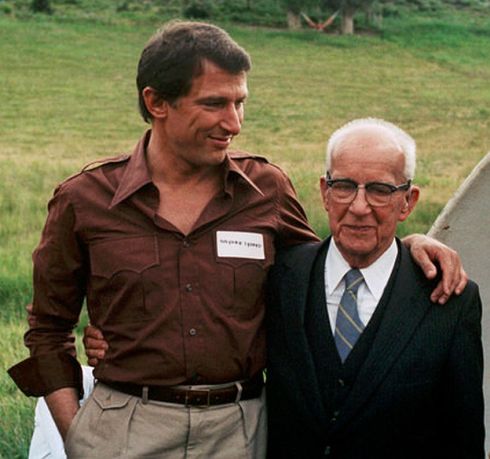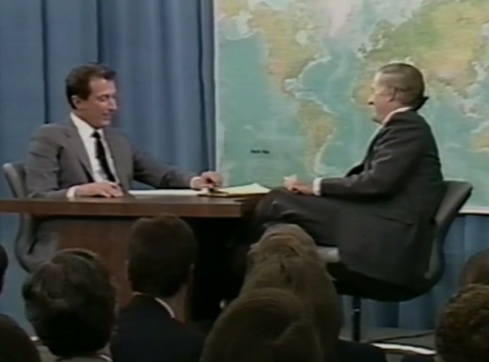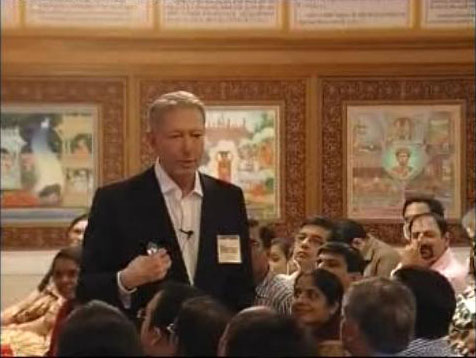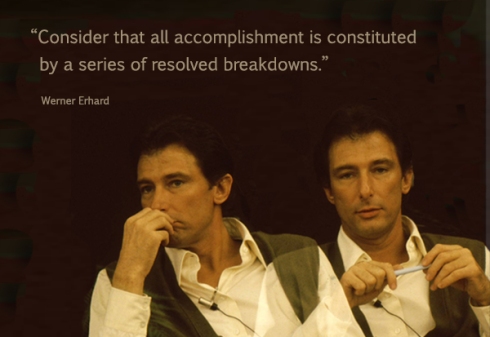You are currently browsing the tag archive for the ‘the est training’ tag.
Follow the ideas of Werner Erhard through time in this compilation of his work and ideas. The timeline illustrates the development of Werner Erhard’s work, for personal, business and academic communities, including notable expressions and acknowledgements, from the inception of Erhard‘s models for transformation made widely available in 1971 through to the present.
Professor Michael Zimmerman’s Afterword to the book Speaking Being: Werner Erhard, Martin Heidegger, and the Possibility of Being Human is his first-person account of discovering parallels between Erhard and Heidegger, and then learning of Hyde and Kopp’s remarkable, in-depth exploration of this unexpected relationship.
Erhard and Heidegger, two seemingly disparate thinkers, arrived at a similar understanding of human being, and they arrived at such understanding independently. Does such deep agreement give credibility to the shared understanding?
Living is really pretty simple. Living happens right now; it doesn’t happen back then, and it doesn’t happen out there. Living is not the story of your life. Living is the process of experiencing right now.
Thinking about right now, figuring it out, perceiving it, arguing, reading about or believing anything about right now – none of these produce any certainty about living.
When you get beyond the symbols and beliefs about now, beyond thinking about it, beyond efforting or working at it, when you get even beyond merely feeling it, when you get all the way up to observing it, being with it, and finally up to totally experiencing it, the uncertainty about living goes away, because you know the truth in the only way in which a being ever knows the truth – by direct experience.
Actually, it is possible to open up the space for people to transcend life, to transcend these things that get in the way of being here now, so that they can experience being here now for themselves.
It is not even true that you are the cause of everything in your life. Rather, that you are the cause of everything in your life is a place to stand from which to view and deal with life – a place that exists solely as a matter of your choice
The stand that one is cause in the matter is a declaration, not an assertion of fact. It simply says, “you can count on me (and, I can count on me) to look at and deal with life from the perspective of my being cause in the matter.”
When you have taken the stand (declared) that you are cause in the matter of your life, it means that you give up the right to assign cause to the circumstances, or to others, or to the waxing and waning of your state of mind – all of which, while undoubtedly soothing, leave you helpless (at the effect of). At the same time, when you see how this works it will be clear that taking this stand does not prevent you from holding others responsible.
The following is from the January 1977 Graduate Review:
GONNEKE SPITS: “A few months ago, Elaine Cronin, who manages the Chicago Center, was in town and Werner took Elaine, Laurel and me to dinner. We’d all been there when est started, and here we were together again. [The full staff in October, 1971, consisted of Phyllis Allen, Elaine Cronin, Sheila Pearson, Jack Rafferty, Laurel Scheaf, Gonneke Spits, and Barbara Wilson.] Werner said something at that dinner meeting that was really incredible for us. He said to us that where est really came from was not just from him as an individual, but out of the relationship that the four of us had. You know, we’d never looked at it that way. To tell you the truth, I always realized Werner was the source of est and thought we just came along with the furniture, you know.
“We got to look at what we all brought with us that was actually a part of the integrity of est. You see, without the part that Laurel represents, and without the part the Elaine represents, it’s not complete, and without the part that I represent, it’s not complete either. As est developed, some things were added that seemed to be necessary for putting it out into the world. Things like what Jack brought in, what Rich brought in, and what other people brought in, too. It isn’t that anyone was personally necessary, but whatever it was that we presented was and certainly is part of what est is.
“My experience of est was that it helped the participants to get more in touch with feelings and emotions and helped them let go of those that were negatively affecting their lives. It led participants to realize experientially our true freedom and responsibility. Strengthening and vitalizing the humanity of the participant, EST opened the space for a greater penetration of grace and more vigorous faith life”
~ Father Basil Pennington O.C.S.O., Monk of Cistercian Order, Roman Catholic Church, world renowned spiritual teacher and author of several books
My notion about service is that service is actually that kind of relationship in which you have a commitment to the person. Service is about knowing who the other person is, and being able to tolerate giving space to their garbage. What most people do is to give space to people’s quality and deal with their garbage.
Actually, you should do it the other way around. Deal with who they are and give space to their garbage.
Keep interacting with them as if they were perfect. And every time you get garbage from them, give space to the garbage and go back and interact with them as if they were prefect. ~ Werner Erhard
WERNER ERHARD: “I’ve had the opportunity and the privilege to count some great men and women among my friends. They all have the same problem: they cannot get their students to be masters as they are—even students with all the intellectual equipment you can imagine. I tell them that the reason they can’t turn their students into masters is that they are fibbing to themselves about the source of their own mastery. They attribute their own mastery to everything other than its actual source: creation. Creating and Being exist in the same domain. And there is a discipline to Being, to creation. The domain of Being has its own rigor; Being is approachable, it is masterable; it’s not nebulous.
“Imagine someone who wants to be a great manager. In the normal course of events, such a man or woman would start off by, let’s say, studying management—perhaps in school, in books, or as an apprentice. Eventually, he or she would collect all the things that great managers have—degrees, credentials, diplomas, great track records, and great biographies. Then, at that point, we say, “Well, Mr. or Ms. X is a great manager!” Later, we send our children to the same schools so that they can become great managers too.
“Except, most of the children who go to those schools never do become great managers. And we explain that failure on the basis of genes, environment, intelligence, opportunity, and the like. It never occurs to us that our template for becoming a great manager, or, more accurately, for becoming a great anything, is backwards. Never do we consider that what makes a great manager is NOT the school, books, or education, but simply BEING a great manager.
“Now, I know that statement looks absurd at first, but it’s a very interesting possibility. If you discipline yourself to look for what’s present, for what is occurring in the moment, then you can ask yourself, “When someone is being a great manager, what is present?” What’s present (and all that is present, really) is being a great manager. What produces greatness, at the moment when greatness shows up, is being great, period. All the credentials follow from that, not the reverse.
“Most people to whom I talk think, “Hey, great! That means I don’t have to go to college!” That’s not what it means. All the learning, apprenticing, practicing, and thinking are still necessary. My point is not that those practices aren’t necessary; my point is that when greatness does show up, none of those practices is the source of it. They do provide the conditions for it, but none are the source of the greatness itself. The source is, very simply, Being great. The question we are concerned with in our work is, how does one master this domain of Being?
“So, I apologize for a very long answer to a very short question, but it hit right at the heart of our work—that of exploring, investigating, and making available what it means to be anything.”
An Interview with Werner Erhard, by Norman Bodek; ReVision: The Journal of Consciousness and Change, Vol 7, No. 2, Winter 1984 / Spring 1985

You and I want our lives to matter. We want our lives to make a real difference – to be of genuine consequence in the world. We know that there is no satisfaction in merely going through the motions, even if those motions make us successful or even if we have arranged to make those motions pleasant. We want to know we have had some impact on the world. In fact, you and I want to contribute to the quality of life. We want to make the world work.
When you look at making the world work, you are confronted by, and cannot pass over, the fact that each year 15 million of us die as a consequence of starvation. This unparalleled failure for humanity enables us to see that the world’s unworkability is located in the very condition in which we live our lives. Thus, it is not people “out there” who are starving; people are starving “here” – in the space in which you and I live. You and I are working to make our lives work in the same condition that results in hunger and starvation.
Starvation both maintains and dramatizes a world that does not work. Persisting throughout history, it has accounted for more deaths and suffering than all epidemics, wars, and natural disasters combined. During the past five years alone, more people have died as a consequence of starvation than from all the wars, revolutions, and murders of the past 150 years. As you read this, 28 people are dying in our world each minute as a consequence of hunger, three-quarters of them children.
The bare statistics are so shocking that we rarely examine the further impact of starvation on our own lives. Hunger, by its persistence, seems to invalidate that our lives could matter. It seems to prove that we are capable only of gestures. It suppresses the space in which each of us lives.
Yet, precisely because the impact of starvation on our lives is so great, its existence is actually an opportunity. It is an opportunity to get beyond merely defending what we have, beyond the futility of self-interest, beyond the hopelessness of clinging to opinions and making gestures.
In fact, in experiencing the truth underlying hunger, one comes to realize that the ordinarily unnoticed laws that determine the persistence of hunger on this planet are precisely the laws that keep the world from working. And the principles of the end of hunger and starvation in the world are the very principles necessary to make the world work.
So this paper is not an explanation, a solution, an opinion, or a point of view about the problem of hunger. It is an examination of what is so about the persistence of hunger, aimed at answering two questions:
1. What are the laws governing and determining the persistence of hunger on our planet? Not the reasons, however cogent; not the justifications, however comforting; not the systems of explanation, however consistent or clever. If we were merely looking for reasons to explain the persistence of hunger and starvation, we could logically deduce them from the facts.
Fundamental laws and principles, however, cannot be deduced. One knows them by creating them from nothing, out of one’s Self. One does not arrive at fundamental laws and principles as a function of what is already known. Such laws and principles do not merely explain; they illuminate. They do not merely add to what we know; they create a new space in which knowing can occur. The test of whether we are dealing with fundamental laws and principles, or with mere reasons and explanations, is whether there is a shift from controversy, frustration, and gesturing, to mastery, motion, and completion.
2. What are the principles of the end of hunger and starvation on the planet? Not new programs of solution, no matter how saleable or clever; not different or better opinions, no matter how arguable; not points of view, no matter how agreeable. This discussion is not about another good idea. It is about revealing the fundamental principles of the end of hunger and starvation on our planet.
Introduction to : The End of Starvation: Creating an Idea Whose Time Has Come by Werner Erhard, 1977
Every era has a relatively small number of original and influential persons, those who generate initiative, discoveries, achievements and insights which shape our own cultures and societies — and often those of future generations. If we know these people well, it is through their works: their campaigns and institutions, their books and inventions, their vaccines, their symphonies, their monuments and their firms.
The Saturday Satellite Series with Werner Erhard was a program designed to give us a new access to such people — a glimpse of the commitments and visions that inform such lives, and that serve as the source of their creations. The series was conducted as a dialogue between Werner Erhard and prominent guest speakers who are widely recognized for their achievements and expertise. These dialogues were designed not to present particular views, but to open an inquiry that elicits creative thinking and productive action from and for all participants.
Since we have been raised and educated in a you or me world, and since very few of us have noticed the shift to you and me, we are going to have to work out the rules for living on our own. We won’t get much help. Werner did share his own perceptions of some of the other new rules, or operating principles, for the you and me context.
1. Respect the other person’s point of view, whether or not you agree with it. Recognize that if you had their history, their circumstances, and the forces that play on them, you would likely have their point of view.
2. Consider life a privilege – all of it, even the parts that are difficult or seem a waste of time.
3. Give up the islands that reinforce mediocrity, the safe places where we gossip and complain to one another, where we are petty.
4. Take a chance. Be willing to put your reputation on the line; have something at stake.
5. Work for satisfaction rather than for credit.
6. Keep your word. There will be times when the circumstances of life will make you forget who you are and what you’re about. That is when you need to be committed to keeping your word, making what you say count.
From the Friends of Werner Erhard Website
“Contributing Transformation in the World” by Werner Erhard, as published in the est Graduate Review, March 1980
In manifesting your aliveness, you will want to follow a principle which was beautifully stated by Albert Schweitzer when he said, “I don’t know what your destiny will be, but one thing I know: The only ones among you who will be truly happy are those who have sought and found how to serve.” Notice that Dr. Schweitzer says “sought and found how to serve.” He did not say “try to serve,” or “try something and drop it,” or “do the best you can.”
Happiness comes from having served successfully.
One continues to expand in one’s ability to serve by meeting the challenge of actually delivering the results.
Decide on a project for which you are willing to take complete responsibility. Complete the project successfully. Relate this achievement to others as an inspiration for them. Your willingness to express yourself may be just the trigger needed by someone else to do something for themselves. From now on, don’t wait for something to happen to you. Actually take responsibility for making something happen. Keep at it until you make it a successful experience for everyone. You can make the difference.
“I am sometimes asked whether I ‘really’ mean that people are wholly responsible for their experience of life, as if I wished to blame people in poor circumstances. For example, I am asked whether accident victims are ‘responsible’ for having accidents. I hope it has become clear in the context I have developed above that such questions might involve an oversimplification. Responsibility, in my view, is simply the awareness that my universe of experience is my own including the experiences of those events in my life I call accidents.
Responsibility begins with the willingness to acknowledge that my self is the source of my experience of my circumstances. And yet, on occasion, some people think that I think accidents do not happen – or would not happen, if I were ‘really’ responsible. I am sure you will understand my occasional dismay when I am asked questions of this sort. On reflection, I usually recall that such questions derive from a well-intentioned (though perhaps limited) view of human dignity, an intention with which I can align myself, since my own intention is precisely to show that the experience of responsibility is enabling, not disabling.
I have no interest in the justification of circumstances or producing guilt in others by assigning obligation. I am interested in providing an opportunity for people to experience mastery in the matter of their own lives and the experience of satisfaction, fulfillment, and aliveness. These are a function of the self as context rather than thing, the self as space rather than location or position, the self as cause rather than self at effect.
I am not saying that you or anyone else is responsible. True responsibility cannot be assigned from outside the self by someone else or as a conclusion or belief derived from a system of concepts. I do not say that you or anyone is responsible. I do say – with me, you have the space to experience yourself as responsible – as cause in the matter of your own life. I will interact with you from my experience that you are responsible – that you are cause in your own life and you can count on me for respect and support as I am clear that I am fully responsible for my experience of you, that is to say, from my experience of the way you are.
Ultimately, one experiences oneself as the space in which one is and others are. I call this the transformation of experience. At the level of source – or context – or abstraction – I am you. That is beyond responsibility.”
From The est Standard Training, published in Biosciences Communication, 1977
We live in interesting times. Each day brings us fresh news of breakthroughs, innovations, and discoveries, along with bold new models and paradigms for their comprehension. Humanity seems intent on articulating a new paradigm of human nature which will at long last render health and well being universally possible.
So earnest is this search for new paradigms of human well being that there are an abundance of them, whose very number have now become problematic. We seek not only new ways to be well, but new ways to seek new ways to be well.
Currently, for example, there is much interest in the paradigms of the East. These, it is hoped, when somehow combined with those of the West, will more deeply heal us. Many hope that a shift away from the Western paradigm, toward the Eastern paradigm, will at last put us on the road to lasting well-being.
There is, in addition, a growing enthusiasm that our current explorations will not merely combine new knowledge with old, but will occasion a paradigm shift in the definition of human health and well being.
The search is on for a profoundly new kind of inquiry, which will enable us this time to see not only where we have been, where we are, and where we are going, but more essentially, will empower us from now on to be who we are while we journey onward.
The authors gladly acknowledge their fraternity with those who seek to articulate a paradigm which no longer locates well being beyond our human reach. Precisely what is wanted is a paradigm which locates well being within our nature. Not only is a shift toward such a paradigm currently underway: what the shift reveals is clearly sound and fundamentally important.
Yet, paradigms have shifted before. In fact, it is their nature to shift, each eventually giving way to its successor as inevitably as the waves of the sea. So the issue in our time is not whether a paradigm shift is underway, but whether we can discover the principles underlying any paradigm shift which will enable us from now on to experience our full humanity during the shift not, as ever before, in the hope that true well being will come after the next shift has been accomplished.
What is wanted and needed during an era of multiple paradigm shifts is not yet another paradigm shift, but the ability to shift paradigms confidently, ably, powerfully, i.e., paradigm mastery. The purpose of this essay is precisely to articulate the principles by which such mastery is occasioned.
We will ourselves neither promote a new paradigm, nor defend those useful in the past, nor justify or rationalize current paradigm shifts. Our aim is to assist, enable, and empower all those participating in the shift of fundamental notions of human well being, so that their work may draw on a mastery of paradigm shifts.
Our purpose then is the articulation of the principles by which paradigms are generated—what might be called the “paradigm of paradigms”: that set of principles, access to which serves as the source of the power and the ability to cause a shift from one paradigm to another. Read More
– Werner Erhard, Victor Gioscia, and Ken Anbender, Being Well
“Breakthroughs are a product of seeing something in a new way, which enables you to see new opportunities and new openings for action that you couldn’t see before. Breakthroughs come as a result of shifting your commitment from the predictable future to a possible future.”
- Werner Erhard
Werner Erhard in discussion with Professor Jonathan D. Moreno, April 2016 at the University of Pennsylvania.
“The way it is,
is enough.
Who you are is enough.
The only thing you have to do
is be.”
-Werner Erhard



